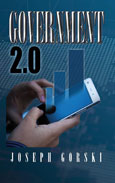
 |
In the down-to-earth voice of a newspaper letter to the editor, author Joseph Gorski examines the current state of the U.S. Government and presents his opinions of various issues he feels are paramount. The premise of this title is that many aspects of our federal government are abusive, outdated, or in need of general reform. Pointing to the current restlessness and distrust by many citizens of government policies and practices, Gorski writes, "Some on the left and right side of the political spectrum are beginning to join forces and question this consolidation of power and abuse of power in Washington, D.C."
The narrative focuses on America's two-party system, Democrat and Republican. The text explores the premise that this polarization does not serve the people but instead manipulates and controls them, a complaint that many U.S. citizens on the entire spectrum agree upon, sometimes for different reasons. The book reads as if the reader is listening to a friendly neighbor discuss politics or watching a favorite newscaster parse complex current affairs into popular terms.
Covered are many topics currently discussed in the media: problems with unequal taxation of the middle class vs. lower taxation for the wealthy and the hoarding of untaxable off-shore wealth, abuses by the international banking system, and various business ills thought to be caused by a bloated bureaucracy. Also discussed is the controversial topic of corporate-controlled media and how it interfaces with the government. The even more contentious issue addressed is the rift between the U.S. medicine for-profit system supported in tandem by the medical insurance and pharmaceutical industries and an emerging government-run universal healthcare system. Gorski opposes some constructs in the current system with more criticism of the pharmaceutical industry than the insurance industry. He is especially opposed to any direct government involvement in administering a healthcare system. Gorski suggests that lower taxation, less government control of wealth, and less control of government by the banking industry will allow people to choose their medical insurance without any government involvement.
The notion of natural redistribution of wealth through lower taxation is a solution presented for most ills explored in this text. Not addressed in-depth are the financial burdens imposed by a for-profit medical system. It is assumed that with greater prosperity that financial barriers and inequities in American life will vanish. Mainstream media is presented as no longer having any real investigative depth or serving as the traditional buffer to government power. Alternative media sources are shown as having all the right answers. However, a strong argument is made for reducing the U.S. military and subsequent reduction of military spending.
At times, the solutions offered come across as too pat and easy. However, the text's cheerful certainty of a more just world emerging through smaller government, financial system reform, and twenty-first-century technology is contagious. Gorski proposes it is high time for America to have a third political party (unnamed in the book) supporting the political, financial, social, and educational fixes proposed in the text.
Thematically, the book embraces the language of digital technology in the title and throughout the narrative, arguing that the positives of the internet age are key to consolidating political and financial power and restoring it from the state to the people. The viral spread of information and the ability for people worldwide to communicate more directly with one another in our digitally connected world makes it more difficult for government malfeasance to exist unnoticed. This book proposes that, as with any computer operating system, it is time for an upgrade. Where some see a dystopian future, Gorski envisions "an age of the superpowered individual." He feels we are on the cusp of a utopian existence that will fully manifest in a restructured world by 2035. Those interested in the nation's current political system and intrigued by ideas to potentially revamp it may enjoy this book.